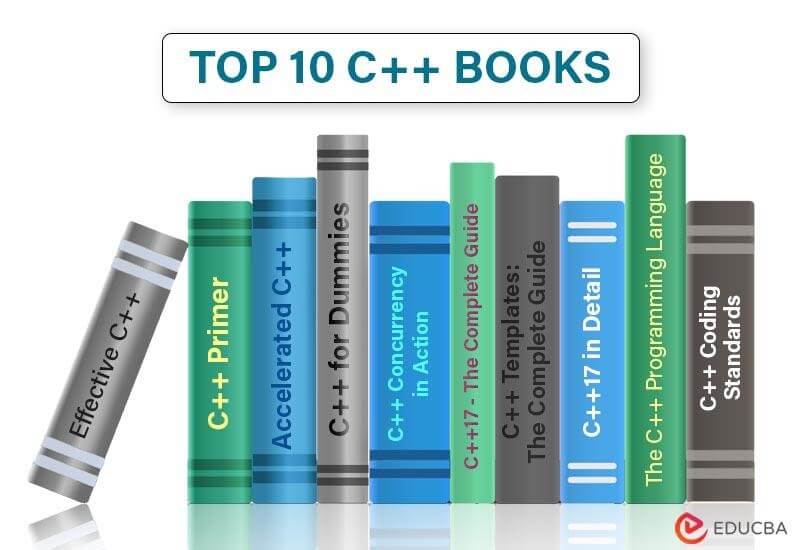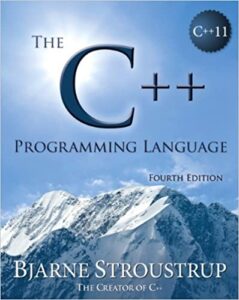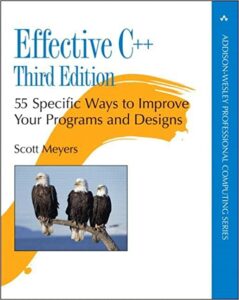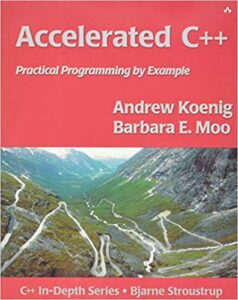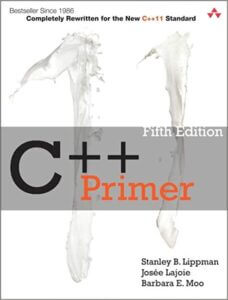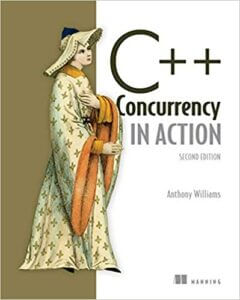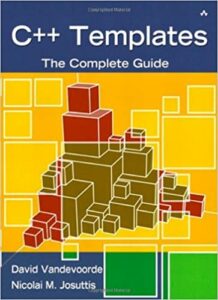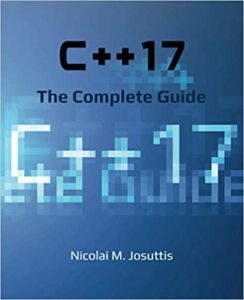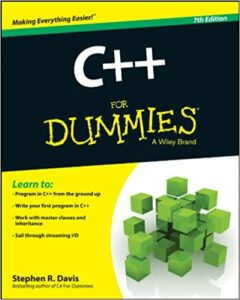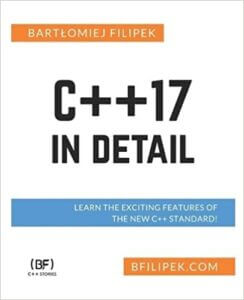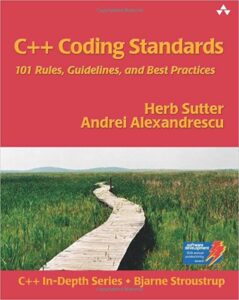Best Learn C++ B0oks [2023]
C++ books can be helpful in several ways. Many C++ books are explicitly designed for beginners and provide a step-by-step guide to learning the language. Even experienced C++ programmers often need to look up specific syntax or techniques. This list of C++ books is a helpful reference guide, providing clear explanations and examples of various language features and programming techniques. By following the advice and examples in these books, you can improve the quality of your C++ code.
Here is a list of ten popular C++ books that you may find helpful for learning and improving your skills in C++ programming.
| Sr. No. | Books | Author | Published | Rating (out of 5) |
| 1 | The C++ Programming Language
|
Bjarne Stroustrup | 2013 | Amazon: 4.6
Goodreads: 4.09 |
| 2 | Effective C++: 55 Specific Ways to Improve Your Programs and Designs | Scott Meyers | 2005 | Amazon: 4.6
Goodreads: 4.40 |
| 3 | Accelerated C++: Practical Programming by Example | Andrew Koenig and Barbara E. Moo | 2000 | Amazon: 4.2
Goodreads: 4.07 |
| 4 | C++ Primer | Stanley B. Lippman, Josée Lajoie, and Barbara E. Moo | 2012 | Amazon: 4.4
Goodreads: 4.22 |
| 5 | C++ Concurrency in Action | Anthony Williams | 2019 | Amazon: 4.7
Goodreads: 4.27 |
| 6 | C++ TemSplates: The Complete Guide | David Vandevoorde and Nicolai M. Josuttis | 2002 | Amazon: 4.4
Goodreads: 4.47 |
| 7 | C++17 – The Complete Guide | Nicolai M. Josuttis | 2019 | Amazon: 4.7
Goodreads: 4.08 |
| 8 | C++ for Dummies | Stephen R. Davis | 1995 | Amazon: 4.2
Goodreads: 3.60 |
| 9 | C++17 in Detail | Bartlomiej Filipek | 2019 | Amazon: 4.6
Goodreads: 4.54 |
| 10 | C++ Coding Standards | Herb Sutter and Andrei Alexandrescu | 2004 | Amazon: 4.6
Goodreads: 4.21 |
Let us go through each book’s review and highlights in detail.
Book #1: The C++ Programming Language
Author: Bjarne Stroustrup
Get the book here
Review:
The book covers the basics of the language and advanced topics such as object-oriented programming, templates, and exception handling. The book covers the full range of C++ language features, including its syntax, data types, and object-oriented programming features. It also covers the Standard Template Library (STL) and the C++ standard library.
Key Points:
- The author mentions how C++ is a powerful and flexible programming language with rich features and capabilities.
- It is essential to understand the underlying concepts and principles of C++ rather than just learning its syntax.
- This book mentions that a good programming style and design are necessary for writing effective C++ code.
Book #2: Effective C++: 55 Specific Ways to Improve Your Programs and Designs
Author: Scott Meyers
Get this book here
Review:
This book is organized around 55 specific guidelines for improving C++ programs and designs and covers a wide range of topics, including object-oriented programming, templates, and performance optimization. The book’s 55 specific items address a particular aspect of C++ programming. Some topics include choosing the correct data type, using inheritance effectively, and avoiding common programming pitfalls.
Key Points:
- The book explains that writing efficient and effective C++ code requires a strong understanding of the performance implications of different programming techniques.
- It says maintainability is an important consideration when writing C++ code.
- According to the author, design patterns can be valuable for organizing and structuring code.
Book #3: Accelerated C++: Practical Programming by Example
Author: Andrew Koenig and Barbara E. Moo
Get this book here
Review:
The book teaches the fundamentals of C++ in a fast-paced and interactive way, using a series of examples and exercises to illustrate key concepts. The book uses a unique approach, providing a series of exercises that gradually introduce new C++ concepts and features. The exercises are accompanied by explanations and examples, making it simple for readers to understand and apply the concepts they are learning.
Key Points:
- Practice and hands-on learning are essential for becoming proficient in C++ programming.
- It is important to understand the underlying principles of C++ rather than just learning its syntax.
- The authors provide some exercises and examples to help readers develop their skills in C++ programming.
Book #4: C++ Primer
Author: Stanley B. Lippman, Josée Lajoie, and Barbara E. Moo
Get this book here
Review:
This book is a comprehensive introduction to the C++ programming language. It covers the basics of C++ syntax and programming and more advanced topics such as object-oriented programming, templates, and the Standard Template Library (STL). The book is aimed at beginning to intermediate programmers and assumes some familiarity with basic programming concepts.
Key Points:
- The book includes the basics of C++ syntax and programming, including data types, variables, operators, loops, and functions.
- It also explains the fundamentals of object-oriented programming, including classes, inheritance, and polymorphism.
- It uses templates to create generic and reusable codes.
- This book introduces the STL, including containers, iterators, and algorithms.
Book #5: C++ Concurrency in Action
Author: Anthony Williams
Get this book here
Review:
It is a comprehensive guide to writing multithreaded applications in C++. It covers the basics of concurrent programming and more advanced topics such as lock-free programming and atomic operations. The book aims at intermediate to advanced C++ developers eager to learn how to write efficient, scalable concurrent applications.
Key Points:
- The author discusses the basics of concurrent programming, including threads, locks, and synchronizers.
- It includes techniques for writing lock-free code using atomic operations and other low-level mechanisms.
- The book has strategies for managing concurrency in C++, including thread pools and task-based programming.
- It also covers advanced topics such as thread-local storage and memory model considerations.
Book #6: C++ Templates
Author: David Vandevoorde and Nicolai M. Josuttis
Get this book here
Review:
It is a comprehensive guide to using templates in C++. It explains the basics of template syntax, programming, and more advanced topics such as template metaprogramming and type deduction. The book aims at intermediate to advanced C++ programmers who want to learn how to use templates effectively in their code.
Key Points:
- The book has the basics of template syntax and programming.
- These include function templates, class templates, and template specialization.
- There are advanced template programming techniques, too, such as template metaprogramming and type deduction.
- The author has given the best practices for using templates in real-world applications, including tips for debugging and optimizing template code.
Book #7: C++17 – The Complete Guide
Author: Nicolai M. Josuttis
Get this book here
Review:
“C++17 – The Complete Guide” is a comprehensive guide to the C++ programming language, explicitly targeting the C++17 standard. The book is suitable for experienced C++ programmers to learn about the new features introduced in C++17. Also, for those who are new to C++ and want to know the language from the ground up.
Key Points:
- The author provides an in-depth understanding of the C++ programming language, including its syntax, semantics, and features.
- The book also has practical examples and code samples to help readers understand how to use C++ effectively and efficiently.
- There are tips and best practices for writing clean, maintainable, and efficient C++ codes.
Book #8: C++ for Dummies
Author: Stephen R. Davis
Get this book here
Review:
The book has a beginner-level introduction to the C++ programming language. The book is suitable for those interested in programming and who want to learn C++ as their first programming language.
Key Points:
- It introduces the basics of programming, including concepts such as variables, loops, and functions.
- It has a step-by-step guide to programming in C++, starting with the fundamentals and gradually covering more advanced concepts.
- It is also a reference guide to C++ syntax and features for easy reference as readers progress through the book.
Book #9: C++17 in Detail
Author: Bartlomiej Filipek
Get this book here
Review:
It is a comprehensive guide to the C++17 programming language, an updated version of the C++ language that includes many new features and improvements. The book covers the major components of C++17, including generalized lambda expressions, nested namespaces, improved return type deduction, and context of statements. It also covers the new parallel algorithms in the Standard Template Library (STL) and the new filesystem library for working with files and directories.
Key Points:
- The book introduces many new features that improve the expressiveness and performance of the language.
- The new filesystem library provides a convenient and portable way to work with files and directories in C++.
- The book provides detailed explanations and examples of each new feature, making it a valuable resource for C++ programmers looking to learn and use C++17 effectively.
Book #10: C++ Coding Standards
Author: Herb Sutter and Andrei Alexandrescu
Get this book here
Review:
This guide will guide you to writing high-quality, maintainable C++ code. The book covers various topics, including naming conventions, design principles, testing, debugging, and performance optimization. It also includes guidance on using the C++ Standard Template Library (STL) and other shared C++ libraries.
Key Points:
- It has high-quality C++ code that requires attention to detail and a systematic approach to design and implementation.
- The authors emphasize the importance of testing and debugging and provide practical tips and techniques for these tasks.
- The book includes extensive coverage of the STL and other standard C++ libraries, making it a valuable resource for anyone looking to use these tools in their code effectively.
Recommended Books
We hope that this EDUCBA information on “C++ Books” benefited you. You can view EDUCBA’s recommended articles for more information.
